- Home
- David Liss
The Day of Atonement
The Day of Atonement Read online
The Day of Atonement is a work of fiction. Names, characters, places, and incidents are the products of the author’s imagination or are used fictitiously. Any resemblance to actual events, locales, or persons, living or dead, is entirely coincidental.
Copyright © 2014 by David Liss
All rights reserved.
Published in the United States by Random House, an imprint and division of Random House LLC, a Penguin Random House Company, New York.
RANDOM HOUSE and the HOUSE colophon are registered trademarks of Random House LLC.
LIBRARY OF CONGRESS CATALOGING-IN-PUBLICATION DATA
Liss, David.
The day of atonement : a novel / David Liss. pages cm
ISBN 978-1-4000-6897-5
eBook ISBN 978-1-58836-963-5
1. Inquisition—Fiction. I. Title.
PS3562.I7814D39 2014 813’.54—dc23 2013049206
www.atrandom.com
Jacket design: Carlos Beltrán
Jacket images: Art Resource, N.Y. (Lisbon cityscape); Gianni Dagli Orti/The Art Archive at Art Resource, N.Y. (sky); Carlos Beltrán (silhouette)
v3.1
Contents
Cover
Title Page
Copyright
Prologue
Chapter 1
Chapter 2
Chapter 3
Chapter 4
Chapter 5
Chapter 6
Chapter 7
Chapter 8
Chapter 9
Chapter 10
Chapter 11
Chapter 12
Chapter 13
Chapter 14
Chapter 15
Chapter 16
Chapter 17
Chapter 18
Chapter 19
Chapter 20
Chapter 21
Chapter 22
Chapter 23
Chapter 24
Chapter 25
Chapter 26
Chapter 27
Chapter 28
Chapter 29
Chapter 30
Chapter 31
Chapter 32
Chapter 33
Chapter 34
Dedication
Acknowledgments
Other Books by This Author
About the Author
Prologue
Lisbon, 1745
When I was a boy, there were days when I was outrageously, deliriously happy, even while I knew such happiness to be a mistake. Perhaps it is merely the way memory works, but over the decade that followed, I came to believe that the day of my greatest happiness was also the last time I knew of any happiness at all.
I recall running along Chiado Hill, moving with the grace and speed possessed only by the young, winding through streets crowded and so narrow I could have reached out and touched the houses on opposing sides. Seven years before that day, when I had been only six years old, my uncle had been trampled to death by a careless fidalgo on horseback not far from the very spot where I ran. My mother often reminded me of the dangers, but I knew better than she—or, I presumed, my late uncle—how to avoid them. I was an expert at dodging beggars and peddlers, avoiding the notice of judgmental priests, and leaping over piles of donkey turds. I knew how to place my feet to avoid slipping upon the street stones, uneven and loose. I made myself an engine of propulsion, as methodical and unwavering in my purpose as the distant windmills on the hills beyond Lisbon.
That day I ran with perhaps a bit more caution than was my usual. I was thirteen years old, and had the sense of invulnerability of all boys that age, but I was also a Portuguese New Christian, and therefore well attuned to the ways in which the universe’s clockwork mechanism produced irony and misery in equal measure. I’d seen men taken by the Inquisition on the same day they were to be married or had witnessed the birth of a child. Both of my grandfathers and one of my grandmothers had died in the dungeons below the Palace of the Inquisition. My mother often said that too bright an outlook invited bad luck, and I knew she was right. But that did not mean she had to be right today.
Over and over again, I put my hand inside my pocket to make certain it was still there—the necklace I had bought, just that morning, from Old Paolo, the peddler. I clutched it and felt the cool of the silver, which somehow reminded me of the softness of Gabriela’s skin. The necklace was for her, and so it seemed to me almost a part of her already, and touching it felt intimate and exciting and forbidden. I also wanted to make certain a pickpocket hadn’t taken it, for to travel five minutes out of doors with silver on your person was to invite theft.
I had lived all my years in fear and uncertainty, for that was the lot of my kind, but that day, at that moment, all was different. I had decided I was in love, and though she had not said so, I was sure Gabriela loved me in return. Earlier that afternoon, we had kissed for the first time, and I knew, right then, how I wanted my life to unfold. I knew how it must unfold because we would not be in Lisbon forever, nor even for long. Soon, we would no longer live in fear. It seemed simple and inevitable.
I was not supposed to know any of this, but I had a habit of eavesdropping. This was surely my father’s fault. If he did not send me out of the room when he discussed matters of importance, I would not have to resort to listening in secret. If he were willing to share with me the family business, I would never have had to teach myself how to unseal and reseal notes without leaving a mark on the wax. I knew he had his reasons. In Lisbon, secrets could be deadly. Perhaps he was right not to trust a boy my age, but someday he would realize how much faith he could put in me. Until then, I would take matters into my own hands.
I never said a word of what I knew, though I ached to tell this secret to Gabriela. By law, New Christians could never leave Portugal, but my father had money secreted away, and he intended to bribe soldiers and customs agents and sailors. He had friends among the colony of English merchants, that confederation of traders called the Factory. I had read the letters, written in code, that my father had sent to his friend the Englishman Charles Settwell. Our family and Gabriela and her father were going to leave. The five of us would flee to England or the Netherlands or France or another country beyond the Inquisition’s reach.
Perhaps it would not be this month, or even this season, but plans were in motion, and they could not be stopped. My father would soon have the money he required, and in Lisbon, the power of money dwarfed the power of the law, the crown, and sometimes, if luck was with you, even the Inquisition.
No, I could not tell Gabriela about any of this, but I could show her what she meant to me. For now, that would have to be enough.
I emerged from a series of dark and winding alleys and onto my own street, wider and brighter, with attached houses covered with glittering tiles. All through the city, bells rang, as they always did, loud and clear and bright. They were the sound of home. I ran past a trio of New Christian traders, friends of my father, clustered in serious conversation, and if they paused to look up at me as I sped past, I thought nothing of it. I offered the men a wave and moved on. I ran past a cluster of dark-robed Jesuits, and if their eyes fell upon me, I hardly cared. I even ran past the very worst of that species, the Jesuit Pedro Azinheiro, an Inquisitor who was said to hate Englishmen even more than New Christians. The man was a dandy, a womanizer, a mockery of a priest, and there was no one more feared among the city’s merchants. Even so, I waved at him as well. I was merely running, and even the Inquisition would not make a crime out of that.
The hill grew steeper yet, and I began to run short of breath, but it hardly mattered. I stopped and leaned forward for a moment, breathing hard, feeling the sweat drip down my back. My shirt, under my waistcoat, clung to my body. It was May, and already as hot as summer. I knew
it would be cooler wherever my father chose to take us. That would be a nice change.
I found her where she said she would be, only a few streets over from our houses, outside the church of São Roque. She sat on the low stone wall, her legs dangling beneath her long brown skirts. She wore a bonnet that covered most of her inky hair, but the sight of a few wayward strands escaping their bondage excited me in ways I did not yet entirely understand.
Gabriela was lovely, and I was by no means the only one who thought so. Grown men stopped to look at her. That buffoon Eusebio Nobreza often attempted to strike up halting conversations with her, but if I was around, we children would start giggling, and Eusebio would storm off, infuriated.
Now neither of us giggled. I walked over to her, still winded from my run, taking in deep breaths as I let the sight of her wash over me. I tried to be subtle even as I stared at her big, dark eyes, her round face, her sharp nose, slightly flat at the bridge. All of her perfections and imperfections cast a spell, and I found that, for a moment, I could not speak.
“You’re late,” Gabriela said, pursing her lips into a knot. “I told you to meet me here before the bells rang.”
Just like that, I was no longer apprehensive. Why should I have been? This was Gabriela, not a stranger. I had no memory of anything before I knew her. We had almost no secrets from each other. She knew the whole of who I was, and knowing that, she had chosen to kiss me that very morning.
“I’m only seconds late,” I told her as I pushed myself up on the wall to sit next to her.
“Still,” she said with a smile both wicked and shy, “you shouldn’t keep a lady waiting.”
“Then I won’t,” I said. “Never again.” I reached into my coat pocket and pulled out the necklace. “I brought you something,” I told her, holding it up for her inspection. What I wanted, more than anything, was to put it on her. I wanted to reach out, placing both hands behind her neck, and gently brush her skin with my fingers as I fastened the hooks. The thought of doing it made my heart pound, and so I hesitated, and that instant became several seconds while I remained frozen, holding up the silver. Gabriela’s eyes went wide and then narrow and finally wide again. What did it mean? I tried to interpret her expression like a Gypsy sorting through tea leaves. As I did, a hand reached out, fast as a rabbit, and pulled the necklace from my grasp. My gift to Gabriela had been stolen.
Once again, I was running, this time downhill, which was both easier and more dangerous. I nearly caught up with the thief just a few streets away. The fugitive was small and quick, but his legs were not as long as mine, and as much as he wanted to escape with the necklace, I wanted it back more. He was greedy, but my need was greater.
I was perhaps ten feet behind the thief when he went flying through the air in an awkward, flailing tumble. His arms were splayed, and his mouth formed an O of terror and surprise. He landed hard, managing to keep his face up, but his chest slammed into the paving stones. I heard his sudden exhalation of pain.
The thief had been tripped. My friend Inácio had apparently witnessed my pursuit from a doorstep, and thrust his foot out just in time. Now Inácio sauntered over to the thief, who remained immobile. He reached down, placing his massive hand over the thief’s slender fist. He forced the fingers apart and took the necklace.
He held it up as I approached. His grin was equal measure pleasure in his conquest and for the opportunity to tease me. “For me?”
I held out my hand. “Of course not. It’s pretty, but not nearly pretty enough for you.”
Inácio hesitated, not because he wanted to take the necklace, I knew, but because it was his nature. He did not need to know whom the silver belonged to, only that it was an object of power, fought over by two people, and that made it interesting. He was from an Old Christian laboring family. His father did work for mine, and while we were an unlikely pair, we rarely passed a day without seeing each other. He was a dangerous boy, though never dangerous to me, and I trusted him completely.
“It’s a gift,” I told him, meeting his gaze, showing him no embarrassment.
A grin erupted under his large, hawkish nose. “Ah,” he said, and dropped the necklace into my hand. “She will like it, I think.”
The two of us now looked down at the thief, who had not yet risen. A few curious passersby had gathered to watch, but most people merely glanced at us as they continued on their way. A thief in Lisbon was hardly remarkable.
I had known the thief was small, certainly not older than me, but only now did I see that he was a Moorish child, eight or nine years old, wearing a tattered robe that had perhaps once been blue. He was hollow-eyed and shockingly thin, with sharp bones pressing out from beneath his skin. He looked up at us with his huge, sunken eyes and managed to raise his arms to protect his face. “Don’t hurt me.”
Inácio kicked him in the stomach. It was more to assert his authority than cause him pain or keep him on the ground. Boys on their own in Lisbon had to know how to protect themselves, and I liked to think I was good with my fists, but Inácio was another matter entirely. I’d seen him make a boy vomit blood after a single kick.
“Stop,” I told him.
Inácio shrugged. “Just letting him know what we think of thieves.”
“Why did you take it?” I asked.
“Because he’s a thieving Gypsy,” Inácio said. “What other reason did you imagine?”
“I was hungry.” The boy pressed his bloody hands to the stones and managed, slowly, to get to his feet. “I thought I could sell it. Please don’t call the soldiers. They will hang me.”
“Hanging’s what you deserve,” Inácio told him. To me, he said, “You can’t let his sad story sway you, Sebastião. Of course he claims to be hungry, but he’ll deliver the silver to his father or his master and they’ll feast tonight. They all claim to be starving.”
They all claim it, but often enough it was true. In this case, I believed it was. I’d seen starving children all my life. I had never seen a rich thief.
“I won’t call the soldiers,” I told him. I then reached into my pocket to retrieve my purse, but remembered it was empty. I had spent the whole of my money on the necklace. It had seemed so important, and yet I knew that if I brought it back to Gabriela now it would feel tainted. It would feel selfish and greedy, and I did not want to associate her with anything shameful.
I held out the necklace to the Moor. “Take it, and may Christ bless you.”
Inácio stepped between me and the young boy. “No,” he said. “You bought that for Gabriela. You can’t just give it away to a thief because he wants it.”
“It’s what I choose to do,” I said.
Inácio put a hand on my shoulder, not unkindly. It was more as though he wished to give me counsel—make me the beneficiary of his hard-won wisdom. “Where is your anger?”
I laughed and shoved him out of the way. “I don’t like being angry.”
The Moor took the necklace and dropped to his knees. He bowed low, touching his head to the street. Then he sprang up and ran, casting a wary look back not at me but at Inácio.
Inácio shook his head. “If I steal from you, do you promise to let me keep what I take?”
“Only if you tell me a very sad story.”
Gabriela was still sitting on the wall when I went back for her. She narrowed her eyes and cocked her head at me. “So. Where is my necklace?”
“The thief took it. I wasn’t fast enough.” I sat next to her, slumping down, performing frustration.
“That’s bad news.” She shook her head at the unpleasant turn of events. “I can’t kiss you unless there is an exchange of gifts.”
I tried to say something, but I had no idea what it would have been if I had been able to make my throat work.
“Although,” Gabriela said, looking upward thoughtfully, “I suppose if I gave you something instead, that would answer.” She unpinned the blue scarf that encircled her bonnet, and pressed it into my hand. “It was a pretty necklace,
and I should have liked to wear it,” her voice now much lower.
“I’m sorry,” I managed.
“I liked it so much that I followed you,” she said. “I wish I could wear it, but there are things I like better than jewelry. I am very fond of kindness.”
She leaned in to kiss me, and relief and love and dizziness swam about my head in equal measures. This, I decided, is what happiness feels like, pure and unalloyed, and I wished the moment could last forever.
But our lips never touched. As I moved toward her, I felt a hand on my shoulder. I started and turned to see my mother. Her face was pale, and lined, as though she wore the mask of a much older woman. Her eyes were red from weeping.
“We must go,” she said. “The Inquisition has taken your father.”
My mother gripped my wrist and twisted until my skin burned, and she pulled me down the hill toward the quays. She had been crying, but now she was calm and controlled, her face as sharp and unmoving as stone. I had seen her like this before. When terrible things befell her, she could easily be consumed by her grief, but if there were responsibilities that required attention, she locked her sadness away. She had business, and she was tending to it.
“Tell me what happened,” I said. “I need to know.”
“It was the Jesuit who has been asking questions. Pedro Azinheiro,” she said, her voice flat and empty, as though reading a letter written in a language she did not understand. “He came with the Inquisition soldiers. If I had not been outside, talking to Senhora Paquda, they would have taken me as well.”
Pedro Azinheiro. I had waved at him like a fool. Better I should have killed him. I wished I could go back and make it all unfold differently. I could have wrapped that silver chain around his neck and choked the life out of him. Instead, my father was gone, arrested. He would be put to the question. He would be made to confess a thousand things he had never done. They would make him say he had lit the candles on Friday night, that he shunned pork, that he fasted on Jewish holy days, that he studied forbidden books and spoke in evil languages. Then, when he at last admitted to all these things, he would be made to say which of his neighbors and business associates had done it with him. He would resist all of this at first, but in the end, everyone said what the Inquisitors wanted them to say. Everyone broke. We all knew it. My father would break too.

 The Whiskey Rebels
The Whiskey Rebels Renegades
Renegades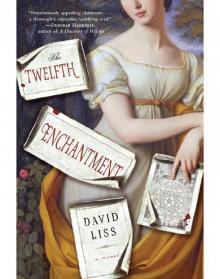 The Twelfth Enchantment: A Novel
The Twelfth Enchantment: A Novel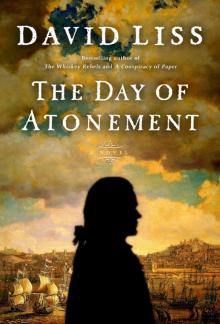 The Day of Atonement
The Day of Atonement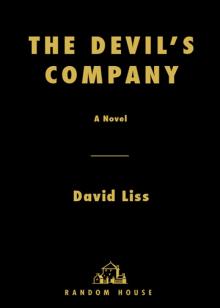 The Devil's Company
The Devil's Company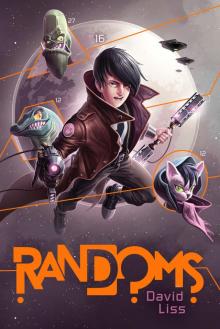 Randoms
Randoms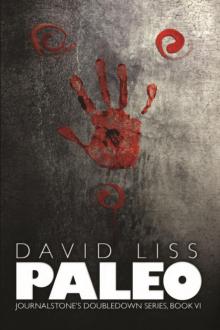 Paleo / The Doomsday Prepper
Paleo / The Doomsday Prepper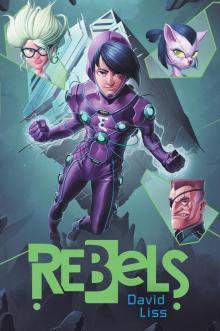 Rebels
Rebels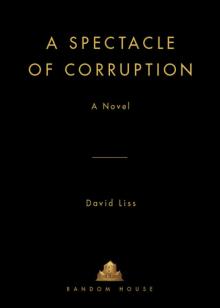 A Spectacle of Corruption
A Spectacle of Corruption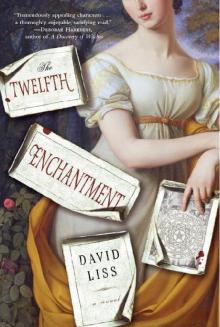 The Twelfth Enchantment
The Twelfth Enchantment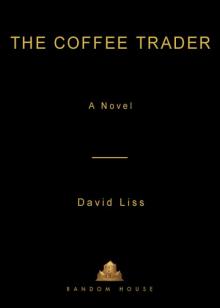 The Coffee Trader
The Coffee Trader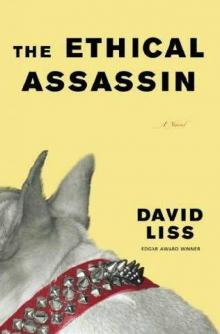 The Ethical Assassin
The Ethical Assassin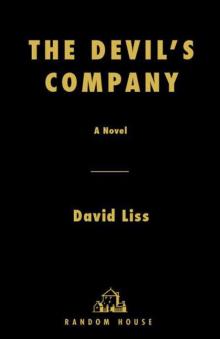 The Devil’s Company: A Novel
The Devil’s Company: A Novel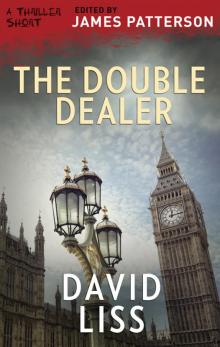 The Double Dealer
The Double Dealer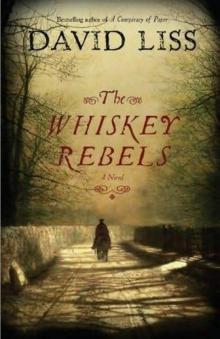 The Whiskey Rebel
The Whiskey Rebel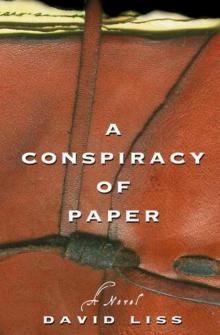 A Conspiracy of Paper bw-1
A Conspiracy of Paper bw-1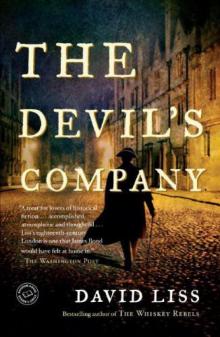 The Devil's Company bw-3
The Devil's Company bw-3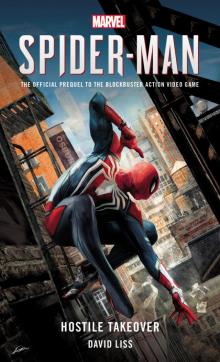 Marvel's SPIDER-MAN
Marvel's SPIDER-MAN